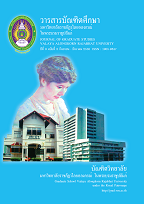ผลของโปรแกรมพัฒนาผู้เรียนตามแนวโยนิโสมนสิการที่มีต่อความสามารถในการคิดรู้เท่าทันสื่อเทคโนโลยี ของนักเรียนมัธยมศึกษาปีที่ 3 โรงเรียนหอวัง กรุงเทพมหานคร THE EFFECTS OF A LEARNER DEVELOPMENT PROGRAM BASED ON YONISOMANASIKARN APPROACH ON THE MEDIA LITERACY OF
Main Article Content
บทคัดย่อ
บทคัดย่อ
การวิจัยครั้งนี้มีวัตถุประสงค์เพื่อศึกษาผลของการใช้โปรแกรมพัฒนาผู้เรียนตามแนว โยนิโสมนสิการที่มีต่อความสามารถในการคิดรู้เท่าทันสื่อเทคโนโลยี และเปรียบเทียบความสามารถในการคิดรู้เท่าทันสื่อเทคโนโลยีของนักเรียนที่เข้าร่วมและไม่ได้เข้าร่วมโปรแกรมพัฒนาผู้เรียนตามแนวโยนิโสมนสิการที่มีต่อความสามารถในการคิดรู้เท่าทันสื่อเทคโนโลยี ของนักเรียนชั้นมัธยมศึกษาปีที่ 3 โรงเรียนหอวัง กรุงเทพมหานคร การวิจัยครั้งนี้เป็นการวิจัยกึ่งทดลอง กลุ่มตัวอย่างเป็นนักเรียนชั้นมัธยมศึกษาปีที่ 3 โรงเรียนหอวัง ภาคเรียนที่ 2 ปีการศึกษา 2557 จำนวน 80 คน แบ่งเป็นกลุ่มทดลองและกลุ่มควบคุม กลุ่มละ 40 คน ด้วยวิธีการสุ่มแบบจัดกลุ่มตัวอย่าง เครื่องมือที่ใช้ในการวิจัย คือ โปรแกรมการพัฒนาผู้เรียนตามแนวโยนิโสมนสิการที่มี่ต่อความสามารถในการคิดรู้เท่าทันสื่อเทคโนโลยี และแบบวัดความสามารถในการคิดรู้เท่าทันสื่อเทคโนโลยี วิเคราะห์ข้อมูลโดยใช้ ค่าเฉลี่ย ค่าเบี่ยงเบนมาตรฐาน การทดสอบค่าสถิติ t – test Dependent Samples และ t – test Independent Samples
ผลการวิจัยพบว่า 1) โปรแกรมพัฒนาผู้เรียนตามแนวโยนิโสมนสิการส่งผลช่วยนักเรียนพัฒนาความสามารถในการคิดรู้เท่าทันสื่อเทคโนโลยีให้สูงขึ้น 2) นักเรียนที่เรียนด้วยโปรแกรมพัฒนาผู้เรียนตามแนวโยนิโสมนสิการมีความสามารถในการคิดรู้เท่าทันสื่อเทคโนโลยี หลังเรียนสูงกว่าก่อนเรียนอย่างมีนัยสำคัญทางสถิติที่ระดับ .05 3) หลังการทดลองนักเรียนที่เรียนด้วยโปรแกรมพัฒนาผู้เรียนตามแนวโยนิโสมนสิการมีความสามารถในการคิดรู้เท่าทันสื่อเทคโนโลยี กลุ่มทดลองและกลุ่มควบคุม มีความแตกต่างกันอย่างมีนัยสำคัญทางสถิติที่ระดับ .05
ABSTRACT
The purpose of this research was to study The Effects of a Learner Development Program based on Yonisomanasikarn Approach on the Media Literacy of Mathayomsuksa 3 Students, Horwang School, Bangkok Metropolitan. The research was the Quasi experimental design. The sample consisted of 80 students who were randomly assigned, 40 students in each group, to form the experimental and control groups. The instruments used were a Learner Development Program based on Yonisomanasikarn Approach, the Media Literacy test, the student’s self-report of learning experiences in each session, the students opinion’s towards the Program and the researcher. Mean, Standard Deviation, Dependent-Sample t-test and Independent-Sample t-test were used for data analysis.
The results indicated that: 1) The experimental group reported that participating in the Learner Development Program based on Yonisomanasikarn Approach helped them developing their Media Literacy behavior 2) There were significantly differences between the pretest and the posttest of the Media Literacy scores of the experimental group at .05 level of significant. 3) After the experiment, there were significant differences of the Media Literacy scores between the control and experimental group at .05 level of significant.
Article Details

อนุญาตภายใต้เงื่อนไข Creative Commons Attribution-NonCommercial-NoDerivatives 4.0 International License.
บทความทุกเรื่องได้รับการตรวจความถูกต้องทางวิชาการโดยผู้ทรงคุณวุฒิ ทรรศนะและข้อคิดเห็นในบทความ Journal of Global of Perspectives in Humanities and Social Sciences (J-GPHSS) มิใช่เป็นทรรศนะและความคิดของผู้จัดทำจึงมิใช่ความรับผิดชอบของบัณฑิตวิทยาลัย มหาวิทยาลัยราชภัฏวไลยอลงกรณ์ ในพระบรมราชูปถัมภ์ กองบรรณาธิการไม่สงวนสิทธิ์การคัดลอก แต่ให้อ้างอิงแหล่งที่มา


